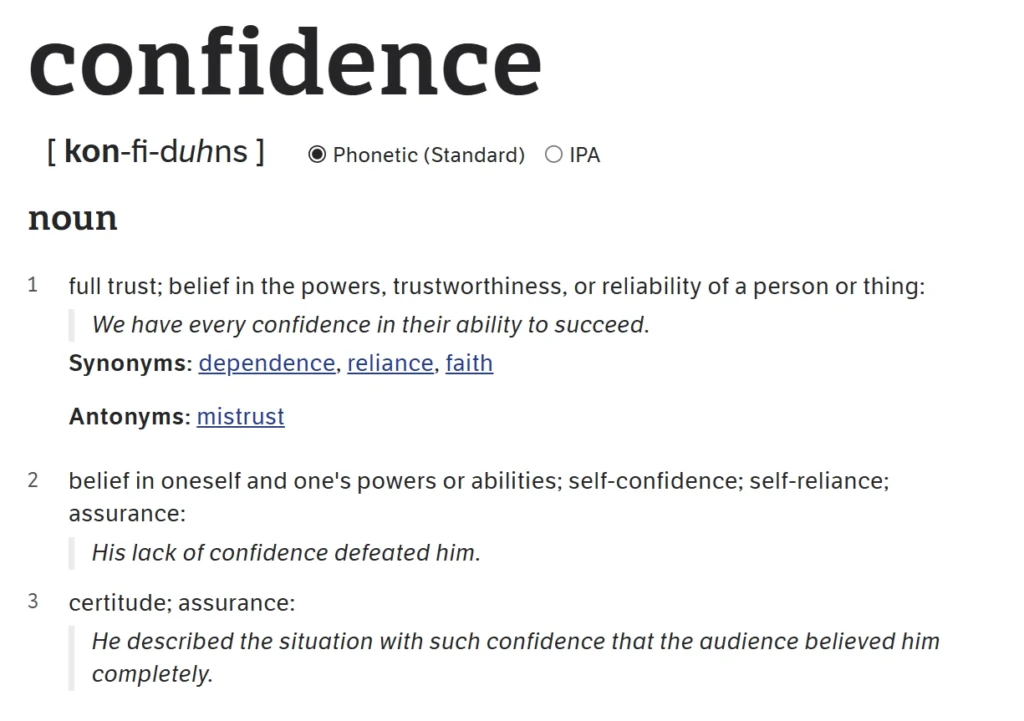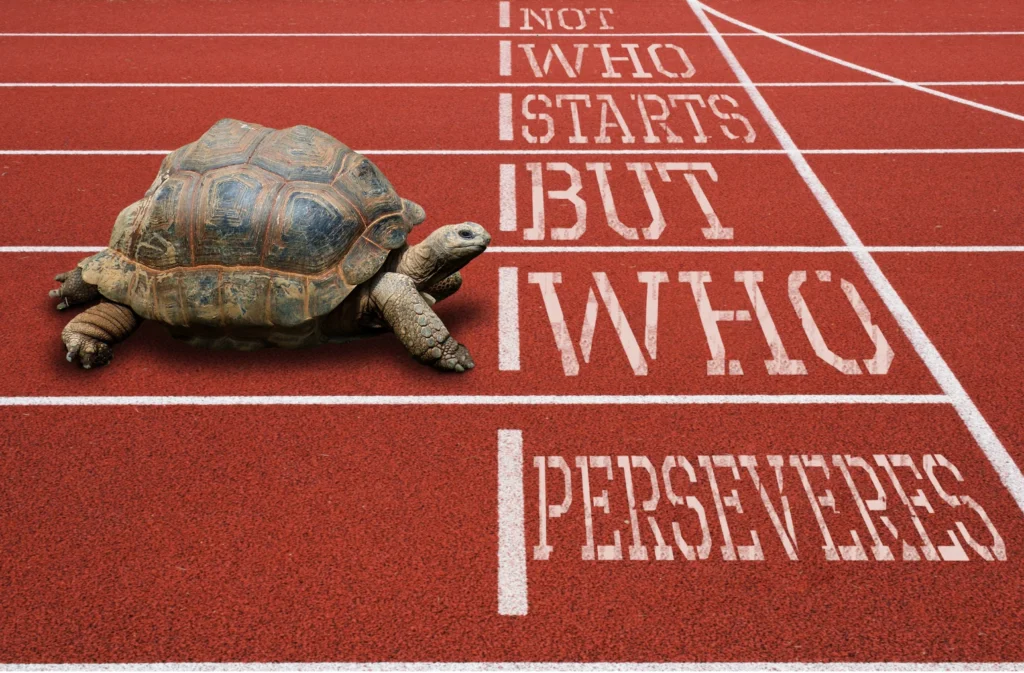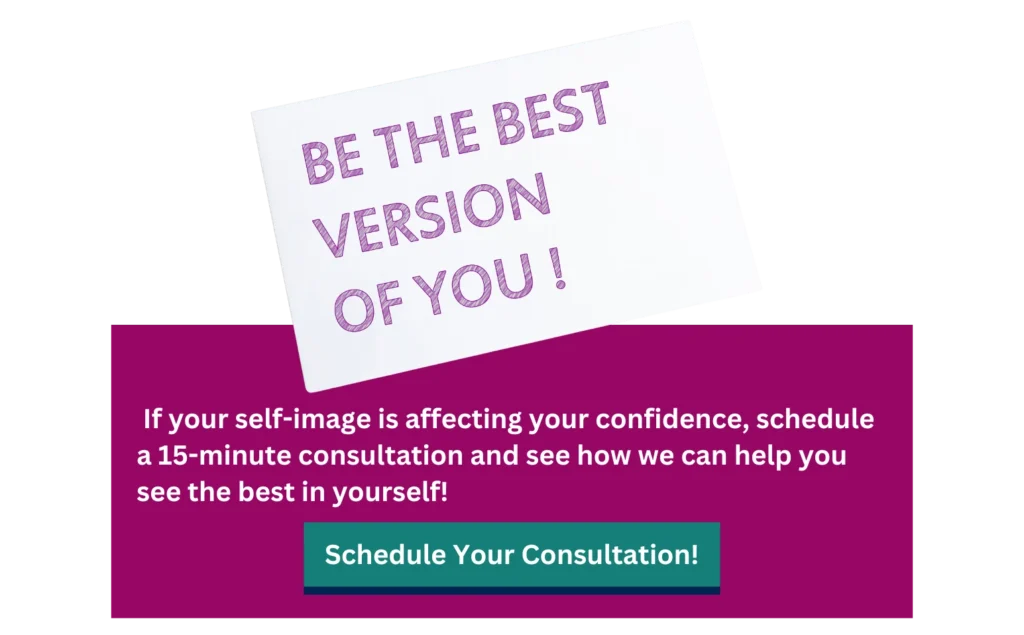
Have you ever noticed that one person who seems to have it all? They’re successful at work, well-liked by their peers, and seem to navigate life in easy mode.
Promotion, check.
Destination vacation, check.
Presented a prestigious award, check.
Regardless of the circumstance, they’re winning! It’s like they’ve got the secret to life. In a sense, they do. This secret isn’t a magic potion or cheat code though–it’s confidence.
Sounds dramatic? Maybe, but that doesn’t make it any less true. Confidence is a powerful trait that influences our interactions and decision-making. In fact, many studies show just how crucial confidence is, affecting every aspect of our lives, from how we navigate interpersonal relationships to how successful we are in our careers.*
What is Confidence?
In layman’s terms, confidence is the belief you have in yourself–your abilities, your qualities, and your judgment. It’s the internal gauge that measures your capability to handle pressure, as well as the inner voice that encourages you to take risks and pursue your goals.

The fact that some people seem to naturally exude confidence has led many to (incorrectly) believe that confidence is an attribute they either possess or don’t. So let’s set the record straight: confidence isn’t a fixed quality, it’s a mindset that shapes you–much the same way your habits and actions shape your physical body. While it may come more naturally to some, with practice, dedication, and self-reflection, you can work to change, develop, and strengthen your confidence over time.
While being confident doesn’t guarantee success, having confidence assures us that we’re capable of handling the outcome if, and when, we do fail. This is because we’ve developed a mindset that views failure as a lesson rather than a state of being and because we trust in our abilities to resolve and move forward from failure.
Why does confidence matter?
Confidence affects our every interaction, shaping how we approach challenges, influencing how we make decisions, and impacting our overall quality of life in the following ways:
Confidence and Decision-Making
If you look at a confident person you admire, what are some of the qualities that stand out? Is it their assertiveness, or their ability to solve problems? Maybe it’s the way they seem to take risks without the fear of failure. If so, what you really admire is their confidence:
- Assertiveness: People with confidence trust their judgment and skills, so they’re more likely to make definitive or assertive decisions and are less likely to second guess themselves. This decisiveness often lands them at the front of the pack when it comes to taking chances and can lead to timely and effective decision-making.
- Problem-Solving: Confident people tend to approach problems with a positive attitude, actively working toward a solution where others may feel overwhelmed or defeated. That’s because a confident mindset is one that views challenges as learning experiences. Their fear of failure isn’t paralyzing, enhancing their ability to solve problems.
- Risk-Taking: When people are confident in themselves and their abilities, they’re more likely to take calculated risks and step out of their comfort zone to embrace challenges and explore new opportunities.
- Reduced Fear of Failure: The fear of failure is one that holds many back, whether it’s because they fear external repercussions or damage to their image. Confidence helps mitigate these fears by helping people see their worth. When individuals are less afraid of making mistakes, they are more likely to make bold decisions and learn from outcomes, fostering growth and improvement.
Confident people trust their judgment and problem-solving capabilities, reducing their fear of failure and making them more assertive and willing to take calculated risks, which can lead to better outcomes in both their personal and professional lives.
Confidence and Resilience
Your ability to bounce back from a setback has a lot to do with your confidence as well, with confidence affecting how people cope with adversity, regulate their emotions, persist against setbacks, and find support when overwhelmed.

Coping with Adversity: Confident people are more likely to stay positive and view challenges as learning opportunities rather than obstacles they can’t overcome.
Persistence: Confident people believe in their capabilities, giving them the motivation and encouragement to bounce back from failures and try again.
Emotional Regulation: Confident people are better able to handle their stress and emotions, enabling them to keep composure during challenging times.
Seeking Support: Confident people recognize that asking for assistance isn’t a weakness, making them more likely to seek help and support when needed.
Confidence and Overall Well-Being
Confident people as a whole recognize their worth, have better self-esteem, healthier relationships, more motivation, and are overall happier in their lives.
- Positive Self-Image: Confident people have a higher self-esteem and a healthier self-image. When people feel good about themselves, they’re more likely to engage in positive behaviors and self-care, which in turn helps them maintain a strong mental health.
- Healthy Relationships: Confident people know they bring something to the table, this makes them more likely to communicate effectively, convey their needs, set their boundaries, and maintain supportive connections, contributing to healthy relationships professionally and personally.
- Motivation: Confident people are the most motivated and committed, as confidence fuels motivation. When people believe they can accomplish their goals, they’re willing to set more ambitious goals and take the steps necessary to achieve them. This promotes personal growth and satisfaction.
- Life Satisfaction: Confident people have higher levels of life satisfaction. This is because of their healthy relationships, better careers, healthy self-image, and constant motivation, and because they feel they have control over their lives, leaving them feeling more fulfilled in both professional and personal pursuits.
What Confidence Affects in a Person

Confidence’s far-reaching effects influence more than your internal characteristics, affecting the relationships you build, how successful you are in your career, and even your emotional well-being and mental and physical health.
Relationships
We’ve discussed how confidence affects decision-making, including how assertive a person is and how they ask for help. People with higher confidence are more likely to communicate clearly and effectively, express their needs, and establish boundaries without an unrealistic fear of the consequences. All of this is crucial to forming and maintaining healthy, lasting relationships.
Career Success
One of the most notable places confident people succeed is in their careers, as confidence can lead to better performance and career advancement. The confidence mindset that allows people to turn failures into lessons increases a person’s skills and enhances their individual performance.
A person with high levels of self-confidence is more likely to stand out as they contribute to meetings, collaborate, and build a stronger network. They’re also unafraid to pursue promotions because they’re confident in their ability to learn and do the job.
Confident employees take initiative, step into leadership roles, and tackle challenges quickly and decisively, making them a valuable asset to organizations. Since confident people know their self-worth and are willing to take calculated risks, they’re willing to leave an organization if they’re boxed into a role and not given the opportunity to grow.
Physical and Mental Health
Confidence doesn’t just affect social abilities, studies show there are links between a person’s confidence level and their physical and mental health.
Physical Health
Confident people tend to live healthier lifestyles, manage their stress more effectively, and have better immune systems.
This is due to confident people being more likely to:
- Participate in self-care by exercising regularly, eating better, and getting a good night’s sleep on a consistent basis. They’re unafraid to take time for themselves if needed, which is why you rarely see confident employees feeling burnt out.
- Manage stress levels and pressure due to their resilience. When people believe they can handle challenges methodically, they’re less likely to experience chronic stress, which can negatively affect physical health by weakening the immune system and increasing the risk for heart disease and heart attacks.
Studies have also suggested that confident people have a better immune system, making them more resistant to illnesses, and allowing them to recover quicker due to their proactive approach to health and willingness to take breaks when needed.
Mental Health
While correlation doesn’t equal causation, and getting help with one’s mental health is a sign of strength, confidence has actually been linked to lower levels of anxiety and depression and increased self-esteem. This is because when one believes in their abilities, they’re less likely to feel inadequate. This confidence increases self-esteem, which acts as a shield against many mental health disorders.
Confident people are also less likely to face mental health issues associated with work. They avoid getting burnt out and rarely struggle with imposter syndrome. This is because they can prioritize tasks when they feel overwhelmed, keep a positive mindset as they work with coping strategies to overcome stressful times, and are more likely to seek help when things get too rough.
What Affects Confidence?
Just like how confidence affects many parts of your life, many factors from your life can also influence your confidence levels, including your self-perception, mental health, life experiences, social circle, mental health, and the culture and society you’re in.
Self-Perception
Confidence is based on so much more than appearance, yet how we view ourselves plays a significant role in our confidence. Positive self-perception can improve your confidence, while negative views of yourself create self-doubt and negatively affect confidence.
In America, a large factor in self-perception is weight. With roughly 40% of the adult American population struggling with their weight. If a person is struggling with weight, they can feel judged based on their looks more than their talent, which can lead to performance anxiety and body image issues–this is one of our specialties at Hamilton Health & Wellness.

Mental Health
Mental health conditions, such as anxiety or depression can significantly impact confidence levels. People who struggle with these challenges may be unsure of their own skills, struggle with self-doubt, and fear judgment from others. All of this can make it harder to have a positive outlook on situations, take risks, and find opportunities before them.
Life Experiences
Our prior life experiences have a large impact on our confidence, shaping it from childhood into our adult years. Early success and opportunity to take risks can boost self-esteem, while failures and previous negative experiences can lead to self-doubt.
Social Environment
As the saying goes, you are what you consume. The people you surround yourself with play a role in your confidence. Those who are constantly negative or who put you down will lower your confidence. Conversely, if you surround you surround yourself with positive, supportive people who uplift you, your confidence will grow.
Cultural and Societal Influences
Societal norms and cultural expectations shape our understanding of the world we live in and can directly impact our confidence. For instance, conventional media portrayals of success and beauty can create unrealistic standards, often leading to feelings of inadequacy and lowered self-esteem.

Conclusion:
While having confidence in yourself won’t automatically fix all of your problems in life, it has been proven to improve your health, mindset, and perception of the world–and even if you’re not a naturally confident person, by intentionally changing your mindset you’ve taken the first step toward unlocking your full potential and becoming self-confidence.
At Hamilton Health & Wellness we understand that confidence is key in life, but confidence doesn’t always come naturally. If you’re struggling with your self-perception and mindset, or if you just need help becoming the most confident you, then schedule a 15-minute consultation with a Healthcare Provider to see how we can help you succeed in becoming a more confident you.
